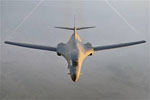Boeing Receives Follow-on Contract to Upgrade B-1 Bomber's Avionics Software
 LONG BEACH, Calif., Oct. 29, 2009 - The Boeing Company [NYSE: BA] today announced it has received an $84 million contract from the U.S. Air Force for additional upgrades of the B-1 bomber fleet's avionics software.
LONG BEACH, Calif., Oct. 29, 2009 - The Boeing Company [NYSE: BA] today announced it has received an $84 million contract from the U.S. Air Force for additional upgrades of the B-1 bomber fleet's avionics software.
The award continues a software-sustainment program that has continually updated and improved the B-1's operational capabilities since the aircraft entered service in 1989. This new contract authorizes Boeing to start work on Sustainment Block 16 (SB 16).
Each software sustainment block includes changes to navigation; weapon delivery; radar; electrical multiplexing; communication/navigation management system software; and controls and displays. Boeing engineers in Long Beach and Oklahoma City deliver the latest avionics software once a year for the Air Force's fleet of 66 B-1s. SB 14 is in flight test at Edwards Air Force Base, Calif., and will be delivered to the Air Force in 2011. SB 15 will be delivered in 2012, and design and development work for SB 16 will begin immediately.
"We are honored to continue providing these upgrades to the Air Force and are excited about all the B-1 potential that will be provided with SB 16," said Mahesh Reddy, B-1 program director for Boeing. "This major block will enhance the aircraft's color cockpit displays, data link, radar and navigation in ways that will significantly improve B-1 aircrews' ability to execute their missions."
Another B-1 milestone that Boeing accomplished this year was the July 30 first flight of a B-1 upgraded with the Fully Integrated Data Link (FIDL). This upgrade includes new processors, color displays and communications architecture, enhancing B-1 crews' situational awareness and communications capability. The FIDL aircraft is also in flight test at Edwards.
The multi-mission B-1 has been carrying the largest strike payload in the Air Force inventory since its combat debut. Its low radar cross-section, variable-geometry wings, advanced avionics, and afterburning engines combine to provide long range, maneuverability, high speed and survivability.